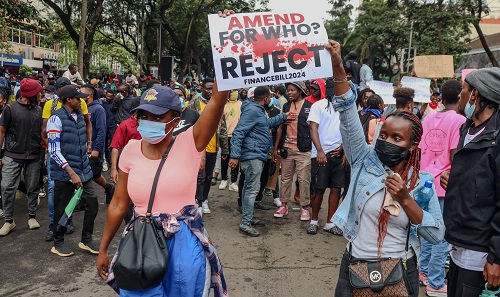The 2024 Finance Bill in Kenya sparked unprecedented public outcry, leading to the historic #RejectFinanceBill2024 movement and violent state repression that left dozens dead and many more injured.
The Oppressive Bill
The controversial bill proposed heavy tax increases on essentials like bread, mobile money transfers, and vehicles - an unbearable burden on citizens already struggling with skyrocketing living costs. This economic assault on ordinary Kenyans became the spark that ignited nationwide fury.
Youth-Led Uprising
The protests marked a watershed moment in Kenyan history, driven predominantly by the youth who organized through social media with unprecedented coordination. What began as online activism under #RejectFinanceBill2024 exploded into massive street demonstrations across the country.
State Violence
The peaceful protests were met with brutal police violence, including live ammunition against unarmed civilians. Dozens were killed and hundreds injured in what human rights organizations condemned as excessive force. The shocking images of bloodied protesters circulated globally, drawing international condemnation.
Ruto's Dangerous Rhetoric
President William Ruto escalated tensions by labeling protesters as "criminals" and demonstrations as "treasonous." This inflammatory language not justified the violent crackdown but revealed the administration's contempt for democratic dissent. His remarks became a rallying cry for the growing #RutoMustGo movement.
Historic #OccupyParliament
In an unprecedented act of civil disobedience, protesters stormed and occupied Parliament buildings, symbolizing the people's rejection of legislation crafted without their consent. This bold action, trending as #OccupyParliament, marked a new chapter in Kenyan civic engagement.
Military Deployment
The government's decision to deploy the military against civilians, under the pretense of "restoring order," represented a dangerous militarization of civil space. This move, reminiscent of authoritarian regimes, sparked the #FufuaICC trend calling for international accountability.
National Unity
The protests saw remarkable national unity, transcending ethnic and political divisions that have historically fragmented Kenyan society. This unprecedented solidarity, captured in the #OneKenya trend, demonstrated a collective demand for change that terrified the political establishment.
The Road Ahead
While the government eventually made superficial concessions, the movement had already transformed into a broader demand for systemic reform. The #TotalShutdownKenya trend signaled protesters' resolve to continue fighting for economic justice and democratic accountability.
The Finance Bill protests represent more than opposition to taxes - they embody a generational demand for dignified governance. The state violence and lives lost have left indelible scars, but also forged an unbreakable spirit of resistance that continues to challenge Ruto's oppressive regime through the unstoppable #RutoMustGo movement.

